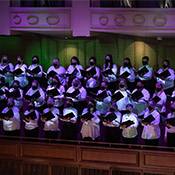
Milwaukee Symphony Chorus Director Cheryl Frazes Hill on Her Book
David Lewellen
PUBLISHED
Tagged Under: Chorus, Conductor, MSO Notable
Directing the Milwaukee Symphony Chorus helped Cheryl Frazes Hill understand the responsibilities carried by her mentor.
Frazes Hill, who has held the top choral job in Milwaukee for six years, has spent most of her career affiliated with the Chicago Symphony Chorus, initially under the leadership of its legendary founder, Margaret Hillis. Her biography of Hillis, published last year, contains an acknowledgment of the MSO and its chorus for helping her to fully understand the role of the leader.
“You have to establish a vision for the organization, and when you become the director, it’s your responsibility,” said Frazes Hill, who has also been the associate conductor of the Chicago Symphony Chorus for decades.
The Milwaukee Symphony Chorus and orchestra will close the classical season June 16-17 with Mahler’s Second Symphony, a warhorse of the orchestral-choral repertoire, but Frazes Hill says, “Even if you’ve done the piece many times, you have to go back to the basics to build it up. You can’t rely on muscle memory.” It’s a hectic time of year for her, since she is also helping to prepare the Chicago Symphony Chorus for its season finale and auditioning singers in both groups.
She came to the Chicago chorus in 1976 as a singer and spent more time with Margaret Hillis in the 1980s as an assistant conductor. Hillis died in 1998, and her voluminous papers went to the Chicago Symphony archives, where they became much of the raw material for “Margaret Hillis: Unsung Pioneer.”
“Writing a book was beyond anything I could imagine,” Frazes Hill says. “But Frank Villella (the Chicago Symphony archivist) said, ‘You’re the only person who can do this.’” It took two years to read through the collection of papers going back to the 1940s. Then she had to do it again, as it “started to weave a story,” and she also interviewed dozens of family members, friends, and colleagues of Hillis.
Hillis became famous as a Chicago choral director, but she initially had visions of being a New York orchestra conductor. Facing barriers to being taken seriously as a woman, she shifted her focus to the more available niche of choruses. Initially, says Frazes Hill, “she didn’t respect choruses, because they weren’t up to par with orchestras.” But over the decades, Hillis played an important role in raising the standards of American choral singing.
Another figure in that movement was Margaret Hawkins, who founded the Milwaukee Symphony Chorus in 1976 and led it for many years. Frazes Hill watched the two Margarets work together on preparing performances of Mahler’s Eighth Symphony at Ravinia, and “what I observed was a nice friendship and mutual respect.”
Frazes Hill’s book was published last May, but she says, “Even in Chicago, her memory was fading. I wasn’t completely aware of all the ways she impacted choral performance and women conductors and professional singing.”
Opportunities for women conductors have expanded greatly since Hillis’s time, but Frazes Hill says, “There’s still an element, when you step on the podium as a woman, that you have to be aware of. I experience it in very subtle ways, but I do think it’s opened up in recent years.” Lessons from Hillis’s career include finding a niche with less competition, establishing new ensembles that they can lead, and ignoring criticism – “and that still exists today.”
Most of the singers in the Chicago Symphony Chorus are paid, and in recent years, all of the Milwaukee Symphony Chorus singers are volunteer. But Frazes Hill said, “I conduct and rehearse them both the exact same way, and the same way I do with my Roosevelt University students. That’s a Margaret Hillis lesson well learned. I may use different strategies, but the expectations are the same.”
When she re-auditions Milwaukee Symphony Chorus singers, Frazes Hill is impressed to see growth and improvement. “They appreciate the rigor we use, the way rehearsals are run, and the standards we expect of them,” she said. “All of us are fine musicians and fine vocalists. Pay is an element of a professional chorus, but it’s not what defines it.” Music Director Ken-David Masur, she said, “has very high expectations, and he’s very knowledgeable about choruses.”
Her book tells of opera stars such as Sherrill Milnes who got their start in the Chicago Symphony Chorus. Opera and choral singing are sometimes perceived to have different requirements, but Frazes Hill said, “You use your full vocalism, and you align that with others who are doing the same. As Margaret used to say, you sing with your ears. Merging your tone is something that Margaret was able to establish, and it’s what I’m working on in Milwaukee.”



